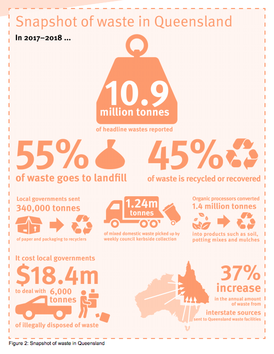A discussion paper advocates a role for Energy from Waste (EfW) in Queensland.
The process of EfW refers to the conversion of waste into fuel, which can take the form of gas, electricity, heat or cooling systems.
It can involve incineration as well as chemical or biological process, such as the use of micro-organisms which munch on the waste and provide byproducts.
After all practical and economically viable opportunities to reduce, reuse and recycle wastes have been exhausted, EfW can be used to extract useful energy (fuels, electricity, heat) from the residual waste before final disposal.
Energy from Waste Policy Discussion Paper, Queensland Department of Environment and Science
There is currently no national policy around EfW, although various states, including Queensland, are taking steps forward in the space.
Several EfW facilities have been proposed across Australia, with construction of the first new EfW plant for MSW commenced in late 2018 in Kwinana, WA.
NSW meanwhile published an EfW policy in 2015, and WA issued a position statement in 2013. Victoria, South Australia, the Australian Capital Territory have also published consultation documents.
Queensland is developing an EfW policy, and released the issues paper in July as part of the process.
Better than landfill but not as good as recycling
The discussion paper, prepared by Queensland’s office of resource recovery, says EfW is better than landfill, but not as desirable as reducing and recycling waste. However it argues there is a place for it in Queensland’s waste management hierarchy.
It also acknowledges EfW can be a “particularly contentious” topic in the community and stresses the need for proper community consultation to ensure sound proposals aren’t rejected or delayed.
The paper says Queensland’s government acknowledges a role for EfW to improve waste management and aid the transition to a circular economy.
“After all practical and economically viable opportunities to reduce, reuse and recycle wastes have been exhausted, EfW can be used to extract useful energy (fuels, electricity, heat) from the residual waste before final disposal,” it says.

It also says adopting EfW would complement a number of Queensland Government commitments around climate change.
Targets include reducing household waste generation by 25 per cent, recycling 75 per cent of all waste, and diverting 90 per cent of waste from landfill by 2050.
Achieving the waste strategy’s recycling targets, and transitioning to a circular economy will take time, the paper says, and a clear policy position on EfW is needed in the meantime.
Meeting community standards
“A clear policy will provide certainty, ensure there isn’t an over-reliance on EfW or undermine other initiatives to reduce, reuse and recycle and ensure community and environmental standards are met,” the paper says.
Queensland produced 10.9 million tonnes of waste in 2017-18 of which 6 million tonnes (55 per cent) ended up in landfill, and the amount of waste going to landfill has increased over the last ten years.
“It is proposed that EfW can help Queensland meet this landfill diversion target by recovering value from waste that is not practical or economically viable to separate and recycle,” the paper says.
It also outlines a set of proposed principles to safeguard human health and the environment, and to ensure reuse and recycling isn’t stifled.
The paper invites feedback on a range of issues including managing any potential environmental impact, planning processes, community enagement and the role of local councils.
Submissions are open until August 26.





Leave a Reply